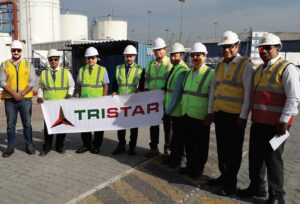
“Our resilient business model is underpinned by long-term contracts with our investment grade customers”
— Eugene Mayne, CEO, Tristar Group.
Resilience, fortitude and foresight have been the hallmarks and defined Tristar Group’s operations under the stewardship of Eugene Mayne, Founder and Group CEO, at the helm.
The continuing Covid-19 pandemic, devastating and unrelenting has challenged companies and economies, both national and global, for their very survival in 2020. The Tristar Group, has demonstrated remarkable buoyancy to buck the downward trend, successfully navigate the turbulence that is impacting many companies and operations and emerge strong despite the demanding landscape.
In an exclusive, expansive interview with Global Supply Chain, Eugene Mayne, CEO, Tristar Group, spoke expansively about his company’s encouraging performance in a new post-Covid business ecosystem; how the company is coping with the new normal operational environment and staving off challenges wrought by the pandemic that has befallen the globe. 
Global Supply Chain (GSC): This year 2020 has been like no other—unusual, challenging and volatile to say the least. Briefly provide us your general introductory comment/s, observations and assessment of the current landscape with regard to multi-modal liquid logistics services?
Eugene Mayne (EM): Fortunately, we have not experienced a major setback in 2020, despite the Covid-19 pandemic, and in fact, expect to end the year on a positive note as our business grew in 2019.
We did experience some segmental challenges due to the overnight crash in oil prices and the measures adopted by governments to contain the pandemic, but we did not experience a material disruption to our operations. We did see a slowdown in our cross-border logistics movements due to mandatory quarantining of drivers at border crossings; however, our fuel storage business was hardly impacted thanks to our take-or-pay contract models. Our remote fuels business supports peacekeeping and humanitarian missions, which have not been curtailed. There are of course some limitations in the movement of troops and flights which have resulted in the reduction of aviation fuel volumes. However, we expect aviation operations to normalise once the pandemic is under control. On the maritime front, our business has grown, and as we expand our operations with new long-term contracts with oil majors, we expect it to grow further. 
GSC: How has the Tristar Group performed to date in 2020 and how do you propose to close this year?
EM: Our greatest achievement this year is having successfully navigated our business through the pandemic without having to implement extreme measures such as laying off staff. Our resilient business model underpinned by long-term contracts with our investment grade customers has ensured that our revenue streams remained stable without the pressure of cancelled contracts or price negotiations.
We expect to close 2020 in a stable position, building on the resilience of our business model.
GSC: How have the working and professional environments changed at the Tristar Group post-Covid 19 and the new protocols in place?
EM: This year has been a challenging year for all industries, particularly with the transition to remote work. However, our company has been able to showcase a resilient business model through effective business continuity plans and due to our people-led approach to business.
We have chosen to find solutions to mitigate the negative impact of Covid-19 by staying focused on reducing service disruptions to customers rather than reducing our workforce. We have set up a Crisis Committee which meets weekly even now to review and monitor the health of our employees and potential disruptions to our services across the 21 countries we operate in.
Astute management of our business continuity plans with day to day oversight by the committee has ensured minimization of disruptions and has ensured that the arrangements for employee testing, isolation and treatments are well.
We organized Covid-19 testing for all our employees and proactively implemented several preventive measures to enable our employees to keep themselves and their families safe during these unprecedented times.
We also provided regular operational updates on emerging situation to our customers, which have been well received as it mitigates the risk of disruption to their individual supply chains. We continue to check in on our employees, to make sure they are doing well both mentally and physically during these tough times.
GSC: What are the Group’s current and future expansion plans?
EM: For the short term, we will focus on strengthening our integrated logistics model by looking for key acquisitions in our areas of interest and ensuring our organic business continues to grow annually in double digits.
Despite the pandemic, our integrated business model is resilient as it has been built on long-term contracts. We will continue to develop and grow this model – a strategy which has worked well for us over the last 20 years.
In terms of next steps and the future, the integration of technology is very important to us and we are constantly working to find the newest technology that is both efficient and cost effective for our current and future projects.
At the moment, we are looking at Robot Processing Automation and Artificial Intelligence solutions to help with predictive maintenance and forecasting analysis which will ultimately increase performance and efficiency. We are also looking at smart ship technology to better improve operating costs on our marine assets.
Overall, we are growing in our core markets and beyond. We are operating soon our India fuel retail business which is a new market for us and look forward to exploring more opportunities there.
GSC: The Tristar Group recently launched a cryogenic liquids transportation service. How is the division doing?
EM: While our organic growth strategy is to widen our client base, we also aim to deepen our service offering in parallel, and therefore branching out into the movement of cryogenic goods by road is a natural diversification for our road transport business, as handling and movement of extremely low temperature liquids and gases requires a high level of specialised training and safety in operations and is a good fit for our high HSE standards. The division is doing well, and we look forward to building a GCC wide network for movement of cryogenic gases and liquids.
GSC: Bring us to current on the construction of storage tanks for JAFZA Chemical Terminal?
EM: We began construction of 10 new storage tanks for our chemical terminal in Jebel Ali Free Zone (JAFZA) in July 2019 and aim to finish the project by May 2021. We acquired this facility from one of our customers as they used to own and operate the facility.
Initially, we bought the chemical terminal from the customer in order to lease it back to them, and the next step was to expand the facility in order to leverage the storage space for other clients as well. We are currently working on increasing the capacity of the terminal from 5,000 cubic metres to 25,000 cubic metres. Next year, 75% of the facility will be completely ready to use, a great achievement for our business.
Other upgrades to the JAFZA chemical terminal that will be constructed in due course include:
- A second loading gantry with 10 dedicated pipelines that can accommodate four road tankers simultaneously,
- Three more new stainless-steel lines from jetty (receipt from ship) to terminal
- Ten drumming lines for flammable liquids,
- A nitrogen generator within the terminal
- A 100-ton capacity weigh bridge and
- A two-story office building with a data acquisition (PLC / SCADA) control room
- Upgrading the fire-fighting and fire alarm system as per latest NFPA / UAE fire code standards
GSC: Comment on your JVs and contracts with Shell and Linde-Sigas?
EM: Earlier this year, our joint venture United Stars in Saudi Arabia signed a five-year contract with Linde-Sigas, a majority owned subsidiary of Linde in the Kingdom, a leading manufacturer of industrial and medical gases. This was a great partnership for us as we have a diverse portfolio of clients in Saudi Arabia with our depots in Dammam, Riyadh and Jubail.
As for our long-standing partnership with Shell, in 2018 we signed a long-term contract to charter six IMO2 25K Chemical Carrier vessels, and we recently inducted four of the six IMO2 25K chemical carrier vessels we ordered from Hyundai Mipo Dockyard, South Korea’s premier shipbuilder.
The new vessels feature Tier III engines which will reduce emissions and operate in an eco-friendly manner. We have worked with Hyundai for many years, as the we previously received six 50K DWT MR tankers from the dockyard in 2016 for US$ 200million.
GSC: How are your Duqm (Sultanate of Oman) operations faring?
EM: We first established our presence in Muscat, Oman in 2002 and we are proud to say we are now a key transporter for the major international and local oil and gas companies in the Sultanate. In January 2020 we acquired more than 11,000 square metres of logistic land in the Port of Duqm where we had constructed our 3,048-square-metre covered warehouse with a capacity of 5,000 pallet positions and an open yard for future expansion. The warehouse project will offer 3PL and 4PL services.
GSC: The comprehensive Tristar Group Sustainability Report is published annually. Briefly summarize your findings and your initiatives in conjunction with your stakeholders in this area of the 8th 2020 Edition?
EM: The 2019 Sustainability Report was developed in accordance with the globally recognized GRI standards and covers our stakeholder engagement initiatives. The report highlights our key Environmental, Social and Governance (ESG) achievements in line with the UN Sustainable Development Goals and UN Global Compact Ten Principles.
With the aim to protect environmental resources, Tristar achieved a 22% reduction in water use per employee and paper consumption. We also offset 25% of 2019 group carbon emissions using the UNFCCC program. Our JAFZA Warehouse in UAE received the prestigious US Green Building Council LEED Gold Green Building certification.
In partnership with RTA and Dubai Chamber, we conducted road safety campaigns for the community and expanded our educational initiatives. Additionally, as part of our commitment towards gender equality, we signed the UN Women’s Empowerment Principles. I was also elected to be one of the Board members of the UN Global Compact UAE Local Network last year.
GSC: You have been known to be a strong advocate of and deeply concerned about sound mental health among seafarers? Tell us more about this endeavor and the Group’s other CSR programmes?
EM: Tristar integrated its Corporate Governance and CSR objectives to create a broader Environmental, Social and Governance (ESG) Framework, as a holistic approach to the planning, monitoring and execution of all activities which support our Sustainability Goals.
As a responsible business operating in the logistics industry, we anchored our sustainability strategy with the adoption of the ESG framework in line with the UN Global Compact (UNGC) Ten Principles and UN Sustainable Development Goals (SDGs).
At Tristar, we have adopted several initiatives of our own to ensure the safety, and more importantly, the happiness and mental wellbeing of our crew and seafarers. When the pandemic first began, we organised three online Psychological First Aid workshops for Vessel Masters and Senior Officers, which had over 90 participants.
The workshops were conducted through video conferencing, to shed light on human behaviour, the signs and symptoms of a person struggling with mental health, and included situational role play to equip Senior Officers with the skills to best deal with these symptoms.
Last November 10, 2019, we hosted our first ever ‘Safety at Sea’ conference with the intention of drawing attention to the number of deaths due to suicides at sea in the maritime world. It was well received and attended by all our customers and other stakeholders from the industry including more than 500 seafarers who watched virtually in India and the Philippines. We are scheduled to host our second ‘Safety at Sea’ conference this December 9 via webinar and going forward we are committed to making this an annual event.
We have also contracted the Sailors’ Society to set up a 24/7 dedicated confidential helpline for all officers, crew and their families. The services include crisis response assistance, counseling through various channels such as email, WhatsApp and other social media chat platforms, and making appointments with counselors on behalf of the seafarer in accordance with the ports they will visit during their contract.
GSC: What are the opportunities and challenges for the Tristar Group going forward?
EM: We are excited about the future. At the moment, we operate in 21 countries and we’re looking to increase our footprint,
expanding with our existing customers while also looking for new opportunities and acquisitions.
The integration of technology is important to us and we are constantly working on finding innovations that will be efficient and cost effective for both our current and future projects; for example, Robot Processing Automation and Artificial Intelligence, in addition to smart ship technology.
Last year I participated in a panel discussion at the Future Blockchain Summit in Dubai where I discussed our digital strategy and pioneering work with Blockchain in the region and how we aim to leverage technology to provide world-class services to our customers.
We were recognized for being the first logistics company in the GCC to have a fully live Blockchain platform, which provides our customers with real-time oversight of our warehousing and transportation processes, so I can confidently say that innovation and technology will be a key area of focus for us going forward. I look forward to participating in more events in the future and establishing ourselves as a key player in the integration of technology in the logistics services industry.
We also look forward to strengthening our ESG programme and implementing sustainable practices across all our sectors. Our commitment to being a strong advocate of the United Nations Sustainable Development Goals (UN SDGs) will continue unabated as we strongly believe that as a private sector company we should lead the way for the business world to pay attention to the health and well-being of people, which will be a top priority for all of us after the pandemic.
In terms of challenges, of course the global pandemic has had an impact on oil prices and the slowdown in cross-border logistics movements due to mandatory quarantining of drivers at border crossings. However, we are hopeful by 2021 that the situation will improve, and government regulations will ease. Our priority is for everyone to stay safe and healthy, and we look forward to a safe future.
GSC: The Tristar Group recently won an award by Arabia CSR Network for its Health and Safety Programme. Expand on this recognition as also the Group’s support of the UN Sustainable Development Goals (SDGs).
EM: In October we were honoured to have been awarded by Arabia CSR Network for our Health and Safety Programme, particularly for our Safety at Sea initiatives. The health and safety of our employees is our top priority, especially now during the pandemic. Seafarers can be particularly susceptible to mental health issues, as they are often far from home, with little contact with family and friends.
Whilst we are all encouraged to talk about mental health, it seems that it is still a taboo subject amongst seafarers and as a result they are missing out on vital support and treatment at the early stages of a severe illness.
The initiatives we have put in place are small steps as part of a wider movement to address these issues and ensure adequate support is provided to our most valuable asset – our people.
I’m honoured that Tristar has been recognised for its work in this space, and I look forward to celebrating many more successes with the team in the future. For the past nine years, we have been a signatory of the United Nations Global Compact with compliance to the Principles of Human Rights, Anti-Corruption, Labour and Environment.
One very important initiative for us, is providing access to education for all as per UN SDG No 5. We have made some progress towards this goal, particularly in Africa. Over the past few years, we have supported the funding and development of two local schools in South Sudan, to help enable access to basic education. In 2018, we established a Computer Lab at the Gabat School in Juba, South Sudan, making it the first primary school in the country to offer computer classes. We are extremely proud of the success of this development as it has provided an opportunity for young children in Sudanese communities to pursue higher education and build a brighter future.
GSC: Any imminent mergers or acquisitions on the cards?
EM: All our expansion plans, whether organic or by acquisition, will have our end customers’ interests in mind.
GSC: Any plans for the Tristar Group to go public / IPO issuance?
EM: It is part of our longer-term growth strategy. We will provide updates in due course.






